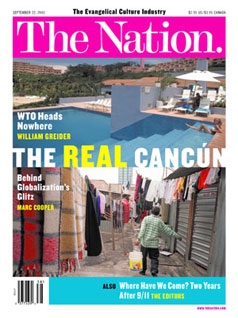The Shame of Prison Health The Shame of Prison Health
Just-released inmates with infectious diseases need continuous treatment.
Jun 13, 2002 / Feature / Sasha Abramsky
Justice Can’t Be Done in Secret Justice Can’t Be Done in Secret
Why public and press have a right to witness military tribunal proceedings.
May 23, 2002 / Feature / Edward J. Klaris
Dick Cheney’s Primer on the Constitution Dick Cheney’s Primer on the Constitution
So what's it called if during war you criticize the President for any reason? Treason. And how long does this war go on (and this is where this theory's really pretty clever)? ...
May 23, 2002 / Column / Calvin Trillin
Vigilante Justice Vigilante Justice
On Friday, September 15, four days after the terrorist attacks, an 18-year-old Moroccan boy received an unusual request from his school guidance counselor: Come see me as soon as ...
Operation Enduring Liberty Operation Enduring Liberty
As the shock of September 11 fades, courts are standing up for civil liberties.
May 16, 2002 / Feature / David Cole
The Cops Are Watching You The Cops Are Watching You
September 11 is being used as a reason to build up police intelligence units.
May 16, 2002 / Feature / Bob Dreyfuss
‘Foreign’? ‘Suspicious’! ‘Foreign’? ‘Suspicious’!
Osmín, a Cuban trucker, is living in Florida legally--but that didn't matter to the department of motor vehicles. When he was stopped on May 2 by a policeman who wan...
May 16, 2002 / Feature / Will Evans
Only the Dead Know Brooklyn Only the Dead Know Brooklyn
For more than a century, a recognizable pattern existed among those migrating to New York City: They came first either through Ellis Island or up from the American South, and m...
May 16, 2002 / Books & the Arts / Theodore Hamm
Europe’s Unwelcome Guests Europe’s Unwelcome Guests
Resentment against immigrants, even those seeking asylum, is at the boil.
May 9, 2002 / Feature / Maria Margaronis
Germany’s Cold Shoulder Germany’s Cold Shoulder
Immigrant workers fuel the ecomony, but still they're treated with suspicion.
May 9, 2002 / Feature / Alisa Roth
